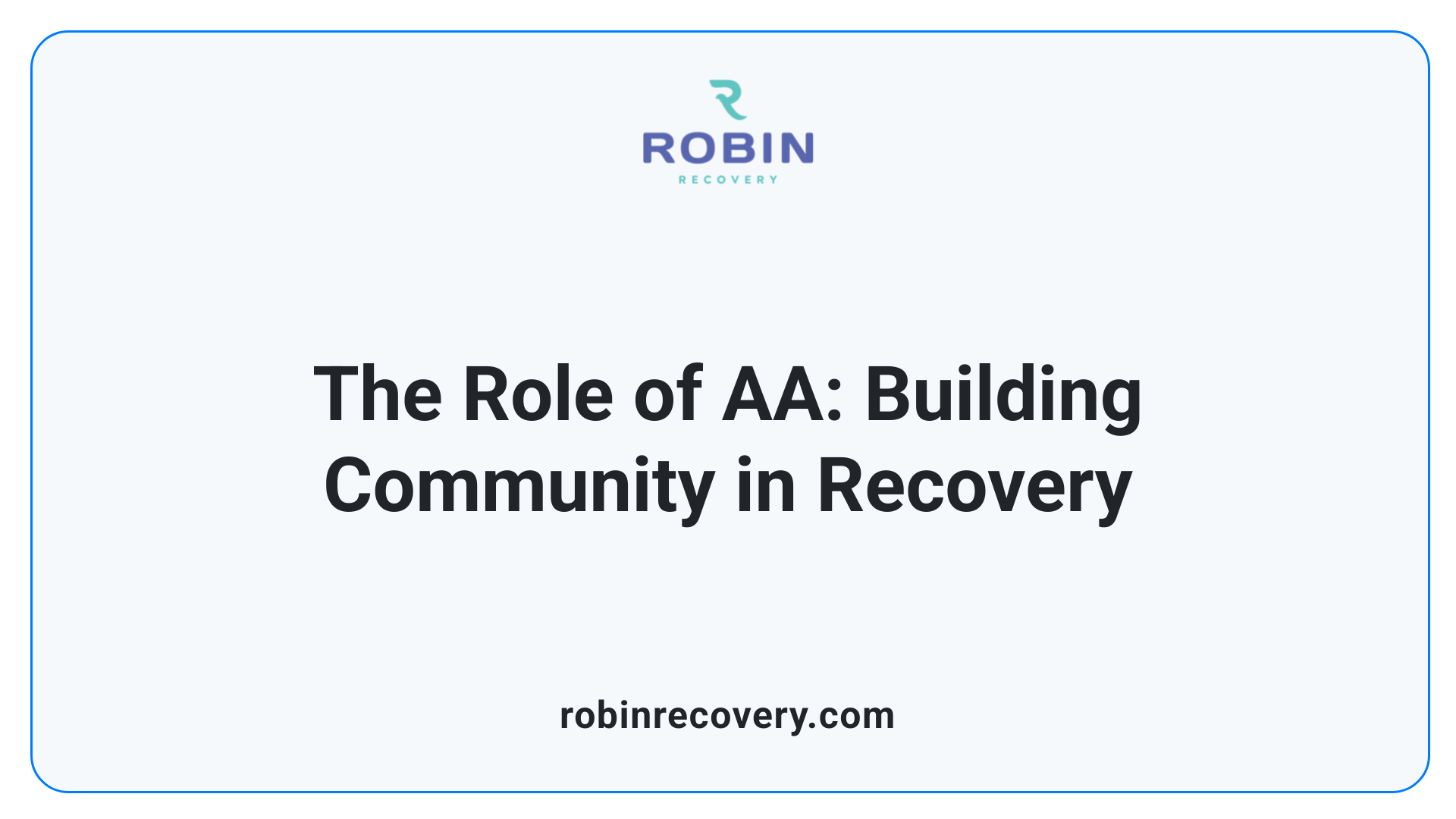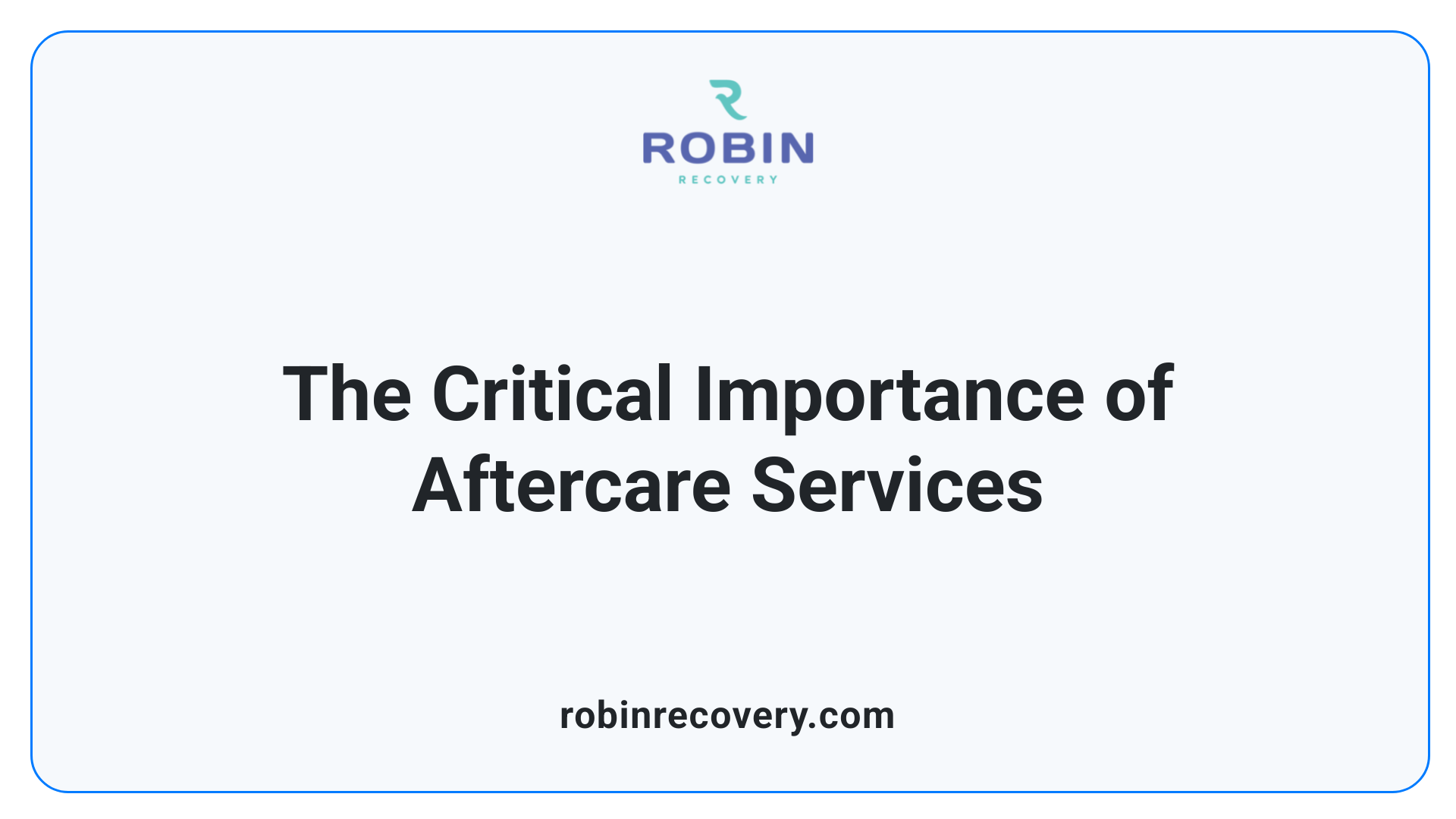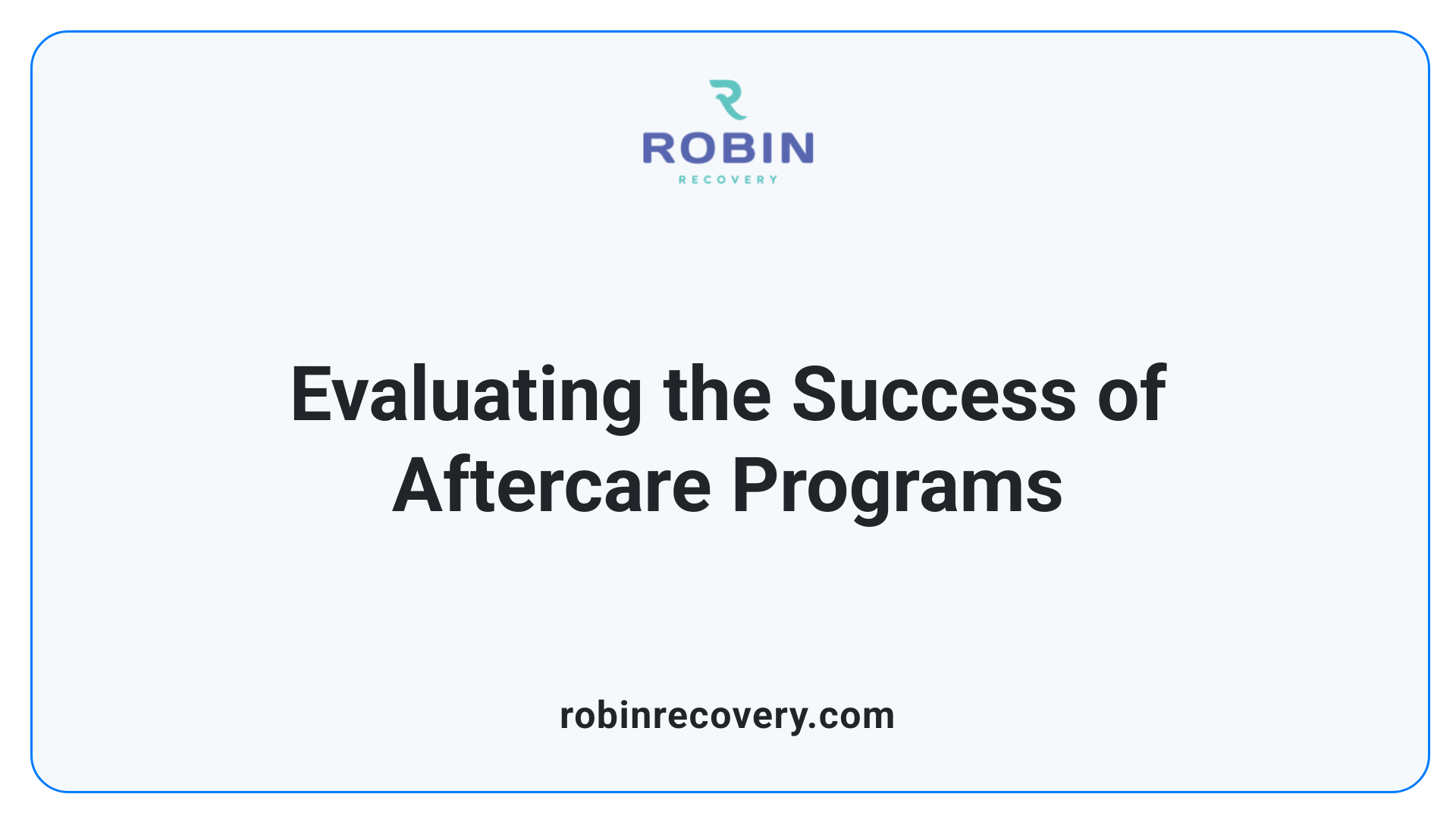The Role of Aftercare Programs in Sustaining Recovery

Navigating Recovery With Aftercare
As individuals emerge from addiction treatment, the journey to sustained recovery begins. Aftercare programs play a pivotal role in ensuring that individuals transitioning from a structured treatment setting to everyday life can maintain the gains achieved during their initial treatment. With the aim to prevent relapse and sustain long-term sobriety, aftercare is a multi-faceted approach addressing emotional, social, and practical aspects of recovery. This introduction to aftercare delves into its importance, functionality, and various offerings essential for continued recovery.
What Comprises an Aftercare Program?

What is an aftercare program in addiction recovery?
An aftercare program in addiction recovery is an essential support system designed to help individuals maintain long-term sobriety after completing a primary treatment program. This is particularly crucial during the vulnerable early stages of recovery, when the risk of relapse is at its highest. Aftercare programs serve as a continuum of care, addressing various aspects of an individual's recovery journey and providing the guidance necessary to navigate daily challenges.
Components of aftercare
Aftercare programs typically include several key components:
- Therapy: Regular individual and group therapy sessions help individuals address underlying psychological issues that may contribute to substance abuse, reinforcing coping strategies developed during treatment.
- Community Support: Support groups, including 12-step programs like Alcoholics Anonymous or Narcotics Anonymous, create a network of shared experiences, fostering accountability and motivation among peers.
- Sober Living Arrangements: Transitional housing options provide a structured, substance-free environment, facilitating the move back to independent living.
- Alum Programs: These programs offer ongoing education and skill training, reinforcing positive behaviors and providing motivation to stay sober.
- Relapse Prevention Education: Education on identifying triggers, managing cravings, and developing coping strategies to handle stress is a prominent feature of aftercare.
- Financial and Housing Support: Assistance with stable housing and financial management can significantly aid individuals in their recovery journey, reducing external pressures that may lead to relapse.
Costs for aftercare services can vary. While some may be included in initial treatment costs, others might offer sliding scale pricing options or free support groups. For additional resources, individuals can contact SAMHSA’s National Helpline at 1-800-662-HELP, which provides free, confidential assistance year-round.
Diverse Types of Aftercare Programs

What are the components and types of aftercare programs?
Aftercare programs in addiction recovery encompass a variety of components and types designed to provide support post-treatment. These programs are crucial for sustaining sobriety and addressing ongoing challenges that individuals may face.
Key components of effective aftercare programs include:
- Individual Therapy: Continuous personal counseling to address unresolved issues.
- Group Therapy: Facilitated support sessions where individuals can share experiences and learn from one another.
- Medication Management: If needed, ongoing medication-assisted treatment can help manage cravings and withdrawal symptoms.
The types of aftercare programs include:
- Sober Living Homes: Structured, substance-free environments that help individuals transition back into daily life.
- Alumni Programs: Programs designed for individuals who have completed treatment to maintain motivation and receive ongoing support.
- Support Groups: Community-based groups such as Alcoholics Anonymous (AA) or Narcotics Anonymous (NA) that provide peer support.
- Ongoing Therapy: Continued counseling to address psychological challenges and reinforce coping strategies.
- Case Management: Assistance with housing, employment, and daily life challenges to support the recovery journey.
How does the T.E.A.M. approach apply?
The T.E.A.M. approach consists of four vital elements: Therapy, Environment, Association, and Medication. This holistic method aims to foster a sustainable recovery journey by highlighting the importance of:
- Therapy: Continuous psychological support to manage addiction.
- Environment: A safe, substance-free living space that minimizes triggers.
- Association: Building connections with healthy individuals and support groups that enhance accountability.
- Medication: Utilization of medication to aid recovery if necessary.
Combining these elements enhances the effectiveness of aftercare by addressing co-existing health issues and helping individuals navigate life’s challenges following rehabilitation.
AA's Impact on Aftercare Success

What is the role of AA in aftercare?
The role of Alcoholics Anonymous (AA) in aftercare is significant in supporting individuals in their recovery journey. AA acts as a complementary support system to clinical treatments, providing a structured 12-step program that promotes self-reflection, accountability, and spiritual growth.
Research shows that individuals who engage with AA during and after treatment tend to have higher success rates in achieving long-term sobriety, largely due to the ongoing support from the AA community. This supportive environment fosters shared experiences and non-judgmental interactions, which are crucial for recovery.
How does community support enhance recovery?
Community support is a cornerstone of aftercare programs, and AA embodies this principle through its peer-to-peer guidance and accountability. By building connections with others who share similar challenges, individuals in recovery can experience a sense of belonging that reduces feelings of isolation.
AA not only offers emotional support but also practical strategies for coping with life's challenges—fostering resilience against potential triggers. The shared commitment among members to maintain sobriety reinforces individual efforts, promoting a culture of encouragement and mutual respect.
In summary, engaging with AA during aftercare significantly increases the likelihood of sustained recovery by combining structured support with a communal spirit, ultimately enhancing long-term outcomes for individuals overcoming addiction.
Why Aftercare is Indispensable in Recovery

What is the importance of aftercare services in addiction recovery?
Aftercare services play a crucial role in addiction recovery by facilitating the transition from a structured treatment environment to daily life within the community. This transition is often fraught with challenges, making it essential to have continued support. Aftercare services help individuals address ongoing issues, such as maintaining sobriety, building new support networks, and finding employment.
These services can take many forms, including:
- Counseling: Individual or group therapy to process experiences and emotions.
- Support Groups: Platforms like Alcoholics Anonymous (AA) foster a sense of community.
- Educational Programs: Workshops focused on life skills, coping strategies, and relapse prevention.
Moreover, aftercare can significantly reduce the risk of relapse by providing continued guidance and accountability. Regular check-ins, therapy sessions, and support group participation empower individuals to apply the skills learned during initial treatment to real-life scenarios.
Overall, effective aftercare is essential for promoting long-term recovery and enhancing the overall well-being of individuals on their sober journey, ensuring they are well-equipped to navigate potential triggers and challenges that arise in daily life.
Continuing Care as a Lifeline in SUD Recovery
How does continuing care impact recovery from substance use disorder?
Continuing care is crucial in the journey of recovery from substance use disorder (SUD). Research consistently highlights that ongoing support post-treatment markedly improves recovery outcomes for individuals dealing with severe addiction issues. Those who actively engage in continuing care often experience better success rates in maintaining sobriety.
The connection between the duration and intensity of continuing care and positive recovery results is particularly strong among high-risk populations. For these individuals, a structured aftercare plan significantly reduces the likelihood of relapse. Studies also emphasize that having consistent primary care visits correlates with increased remission rates, underscoring the necessity of integrating broader healthcare services into addiction treatment.
New intervention strategies including mobile health technology and incentive-based programs are emerging as effective tools to enhance continuing care. These innovations provide accessible support and encouragement, making it easier for individuals to stay committed to their recovery plans.
In conclusion, while the positive effects of continuing care on SUD recovery are well-documented, the effectiveness can vary depending on factors like implementation strategies and individual patient circumstances, affirming the complexity of recovery processes.
The Effectiveness of Aftercare Programs

Why are aftercare programs considered beneficial and effective?
Aftercare programs are recognized for their vital role in maintaining recovery and preventing relapse after initial treatment. Given that relapse rates can be as high as 40-60% within the first year, aftercare provides essential support in addressing the diverse challenges individuals face during recovery.
These programs often include components such as:
- Individualized therapy: Tailored sessions help address personal struggles, fostering deeper emotional processing.
- Support groups: Community interaction with peers reinforces shared experiences, enhancing accountability.
- Sober living arrangements: These create a structured, drug-free environment conducive to recovery.
- Education workshops: They provide individuals with knowledge about relapse triggers and coping strategies.
Furthermore, aftercare emphasizes the importance of ongoing communication with family and healthcare providers. Family involvement not only helps rebuild trust but also improves connections essential for sustained sobriety.
Long-term recovery outcomes
The effectiveness of aftercare is evident in long-term recovery successes. Studies illustrate that engagement in aftercare correlates with reduced substance use and increased stability in personal and professional areas of life. Individuals who participate in aftercare programs enjoy:
- Enhanced mental health due to continuous psychological support and coping strategy reinforcement.
- Improved social functioning through built-in recovery communities.
- Better employment outcomes stemming from support in life skills like job training and financial management.
Overall, the adaptability and comprehensive nature of aftercare programs significantly increase an individual's ability to achieve and maintain long-term sobriety, proving essential for lasting recovery from addiction.
Supporting the Transition to Daily Life
How do aftercare programs support the transition from treatment to daily life?
Aftercare programs play a crucial role in supporting the transition from treatment to daily life for individuals recovering from substance use disorders. These programs provide a range of ongoing support that helps reinforce the skills learned during the initial treatment phase.
Key elements of aftercare include:
- Ongoing Therapy: Regular sessions, including both group therapy and individual counseling, focus on maintaining sobriety while addressing potential triggers and challenges.
- Community Support: Participation in support groups creates an environment where individuals can share their experiences and receive motivation from peers, significantly enhancing accountability.
- Life Skills Training: Programs often incorporate training in crucial life skills such as job readiness and financial management to ease reintegration into daily life.
- Family Involvement: Engaging family members through counseling and education strengthens relationships, rebuilding trust and communication, which are vital for recovery.
- Structured Environments: Models like Recovery Maintenance Programs provide a framework for continued support with consistent monitoring and performance-based incentives for drug-free behavior.
Components of effective aftercare
Effectively tailored aftercare goes beyond just support; it adopts a holistic approach that involves comprehensive services designed for each individual. Key components include:
- Sober Living Arrangements: Environments free from substances mitigate the risk of relapse while individuals adapt to their new routines.
- Educational Workshops: These sessions educate individuals about coping mechanisms and relapse prevention strategies, enhancing their ability to navigate daily life.
- Mobile Health Interventions: Innovative uses of technology, such as apps for mental health support and reminders for meetings, are emerging as effective additions to traditional aftercare.
- Extended Care Options: Customized aftercare plans may extend for several months to a year, ensuring that individuals receive the necessary support throughout their recovery journey.
Overall, aftercare is essential for sustaining recovery and improving long-term outcomes for individuals as they transition back into daily life.
The Comprehensive Role of Aftercare
Aftercare programs have proven to be an indispensable element in the journey of addiction recovery. Offering a lifeline to individuals transitioning from intensive treatment into their daily lives, aftercare ensures that the foundational skills acquired during initial therapy are not only retained but continually strengthened. As addiction is a chronic condition, the significance of aftercare lies in its responsive and adaptive support system, offering a safety net against relapse and fostering long-term sobriety. From customized therapy to community support, the diverse components of aftercare work in synergy to empower individuals, enriching their recovery journey and enhancing their overall well-being. Engaging with aftercare can indeed be the key to unlocking a sustainable, healthy, and sober life beyond addiction.
References
- The Importance Of Aftercare In Recovery - Addiction Center
- The Importance of Aftercare in Sustaining Addiction Recovery
- How Aftercare Programs Can Make a Difference in Your Recovery?
- The Importance of Aftercare Programs in Sustaining Sobriety
- Navigating Life after Rehab: The Importance of Aftercare Programs ...
- Aftercare Programs for Long-Term Sobriety - Grand Falls Recovery
- The Vital Role of Aftercare in Sustaining Long-Term Recovery
- Aftercare Programs: Meaning And Role In Addiction Recovery
